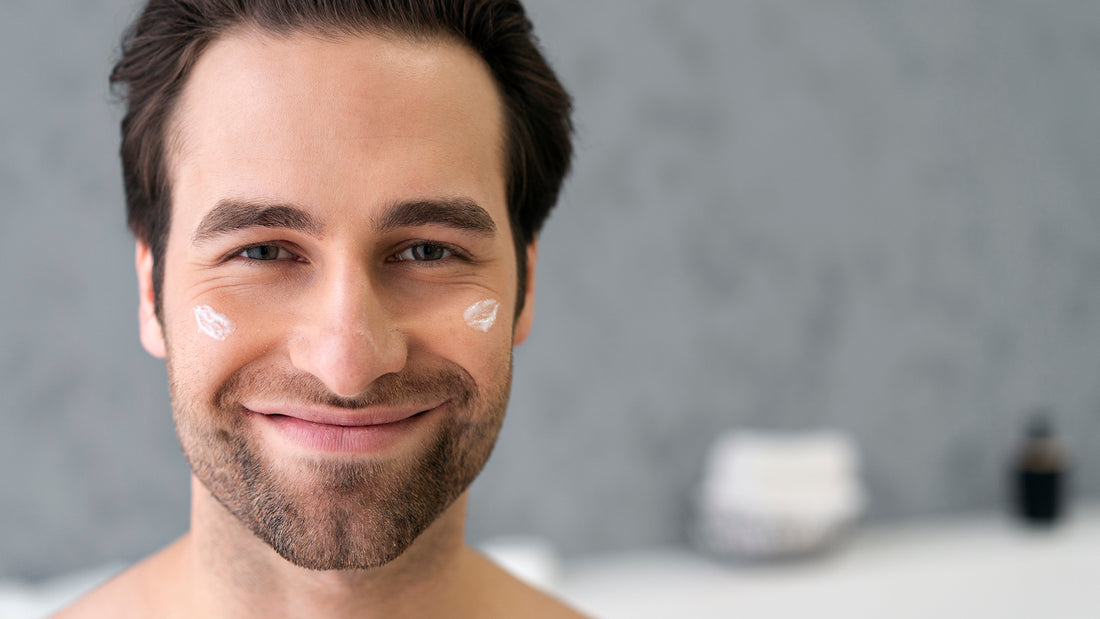
A guide to men's facial skin types
Share
Facial care for men
It’s a well-known fact that skin care is the best way to keep our bodies healthy and balanced. However, sometimes it can be difficult to figure out how to care for our skin in a way that suits our skin type. Just like blood types, we are all born with a unique skin type, and without knowing this, it’s difficult to figure out how to properly care for our skin. By figuring out how to best care for your skin, you can choose products that meet your unique needs and avoid serious skin problems that can make your skin look less than perfect.
Oily skin
Oily skin is one of the most difficult skin types to define because while it may seem like your skin needs one thing, it actually wants something else. For example, it's a common misconception that if you have oily skin, you should stop moisturizing because your skin is already wet. However, many people have oily skin because their skin is dry and produces more oil to compensate. Other common signs of oily skin include enlarged pores, a buildup of dirt that causes blackheads and acne, and a shiner after washing your face than other skin types.
To properly care for oily skin, it is essential to exfoliate your skin regularly, as oily skin generally requires more cleansing than dry or normal skin. It is also very important to moisturize your skin, as oily skin also needs moisture. If you feel that your current skincare products are not suitable for your skin type, try to find oil-free products so that you do not make your skin more oily than it needs to be.
Dry wine
If you have dry skin, you'll notice that your skin becomes itchy, red, flaky, and tight when it's not getting enough moisture. Strong winds, sun damage, and exposure to heat all contribute to dry skin by making symptoms worse, so try to avoid irritants at all costs. Other things can also cause dry skin, such as using the wrong products that dry out your skin, or having serious skin conditions like psoriasis, eczema, or dermatitis. It's important to figure out what's causing your dry skin because once you figure out the cause, you can learn how to treat the problem.
To care for dry skin, you need to be very careful and use products that don't cause inflammation. Products that have a lot of chemicals in them are not good for dry skin, so choose products with more natural ingredients because they are easier on the skin. Gentle cleansers, creamy moisturizers, and hydrating serums are all great for dry skin because they keep the skin moisturized without making inflammation or dryness more uncomfortable. You can also use a gentle night cream to keep your skin soft while you sleep. This will help repair your skin overnight, so you can feel good and your skin will look fresh. Avoid exfoliating your skin if you have dry skin because it will make your skin worse by making it more inflamed.
For combination skin
Combination skin can be difficult to treat because, as the name suggests, it is a combination of two or more different skin types. For example, if your T-zone is oily but your cheeks are quite dry, you have combination skin because your skin is different in each zone. People with combination skin need to be very careful about how they care for their skin and what products they use because their skin is more prone to blemishes than other skin types.
For those who don't know how to treat combination skin, it can be difficult to decide what to do to properly care for their skin, but once you've determined which areas are dry and which are oily, you can adjust your routine accordingly. This means using different products on your oily T-zone, such as cleansers and exfoliating face masks, and more hydrating products on your dry areas, such as serums and moisturizers. Treat each area of your skin by following each type, using several different products, not just one for your entire face. It may be a little more work to take care of combination skin, but you can have great skin if you take care of it properly.
For sensitive skin
Although sensitive skin is less common in men than women, men can still have sensitive skin, and it can be difficult to manage. Sensitive skin is a skin type that is easily irritated, and the skin can become patchy or inflamed when it comes into contact with something harmful. People with sensitive skin often find that a particular product they have used causes their skin to become inflamed, so it is important to check the ingredients in any product you buy before applying it to your skin. Do a quick spot test on your hand before applying anything to your face, this will help you decide whether the product is suitable or irritating to your skin.
Sometimes sensitive skin can also be caused by someone having a serious skin condition, such as eczema, dermatitis, or psoriasis. This can make you very sensitive to many different products, so it's important to be gentle with your skin if it's sensitive. Using high-quality, chemical- and fragrance-free products is best to keep your skin calm and avoid inflammation from the wrong product.
Next step
Once you have determined your skin type, you need to learn how to properly care for it. Using skin treatments like almond peels or facials from time to time will help your skin regenerate so it looks healthy for as long as possible. If you have sensitive skin, LED light therapy may be beneficial because it provides a deep facial treatment without the intrusion of microdermabrasion or active peeling.




